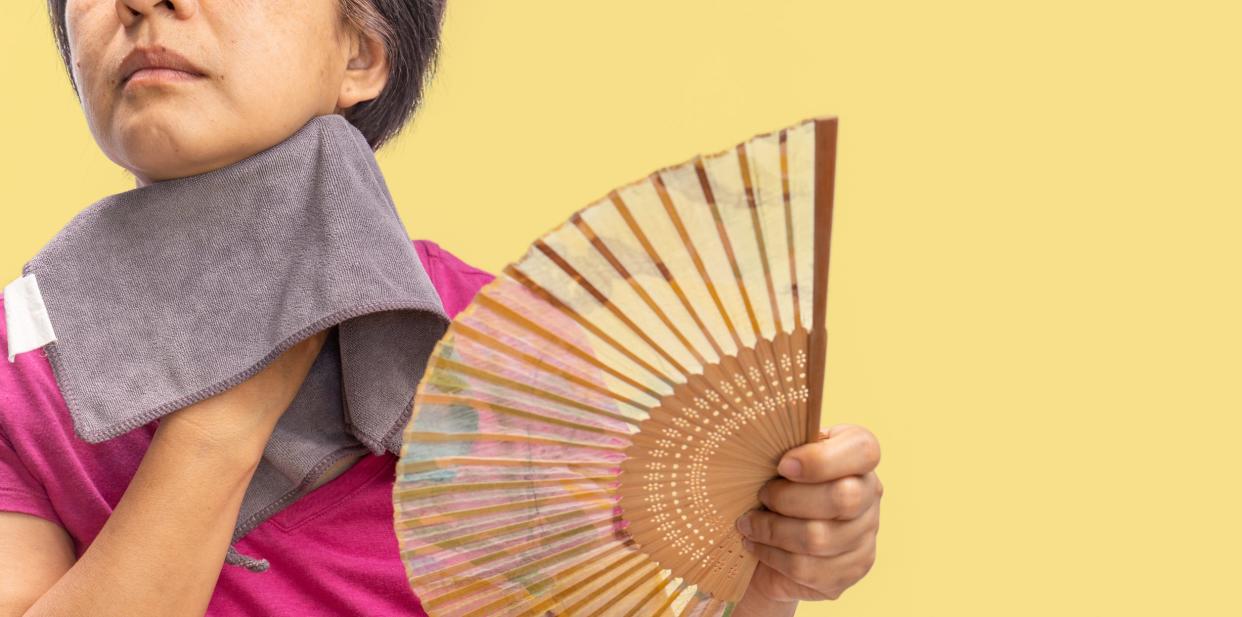Why some doctors shy away from hormone therapy for menopause – and what to know about risks

Hot flashes. Night sweats. Depression and anxiety.
Menopause symptoms can range from disruptive to debilitating, yet health experts say many clinicians have historically shied away from hormone therapy as a treatment option.
But mounting evidence shows how the benefits may outweigh the risks for most women suffering from menopause symptoms, according to a paper published Tuesday by the American College of Cardiology Cardiovascular in Women Committee.
“People have been very scared to recommend therapy for women,” said co-author Dr. Leslie Cho, director of the Cleveland Clinic’s Women’s Cardiovascular Center. “But it’s really important that we understand who to give hormone therapy and who to not give it to.”
More than 1 million women in the United States experience menopause each year, according to the National Institute on Aging, and it’s estimated about 85% of postmenopausal women have experienced symptoms in their lifetime. Menopausal transition typically begins between the ages of 45 and 55, and typically lasts about seven years.
Women's health: Doctors should screen pregnant people for high blood pressure regularly, task force says
What is hormone therapy?
During menopause, the ovaries no longer produce high levels of hormones like estrogen and progesterone, according to the Cleveland Clinic. Hormone therapy can be used to boost hormone levels and relieve menopause symptoms, which typically last an average of five years but can be as long as 10 years.
The American College of Obstetricians and Gynecologists, American Association of Clinical Endocrinology, the Endocrine Society, and the North American Menopause Society recommend hormone therapy for certain patients to manage menopausal symptoms.
Types of hormone therapy:
Estrogen therapy: Estrogen, alone
Estrogen progesterone/progestin hormone therapy (EPT): Combines doses of estrogen and progesterone or progestin
The Cleveland Clinic says doses can be given as pills, creams, vaginal rings or insert, patch, or spray.
'Grin and bear it': Why hormone therapy has been underutilized
Until recently, menopausal women who shared symptoms with their doctors were told to “grin and bear it,” Cho said.
This may be partly due to medical bias – the assumption that menopause symptoms aren’t serious – but it’s also partly explained by findings from a large study from 2013 that "led to a lot of myths and misguidance as it relates to treating menopause," said said Dr. Juliana Kling, chair of the division of women’s health internal medicine at the Mayo Clinic, who is unaffiliated with the new report.
Although the robust study was highly regarded after following more than 27,000 menopausal women for 10 years, Kling said it outlined risks and benefits of hormone therapy in mostly older women where the average age was 63.
But subsequent studies have found the benefits of hormone therapy largely outweigh the risks for healthy women in the early stages of menopause.
Hormone therapy: Who is at risk?
The report, published Tuesday in the peer-reviewed journal Circulation, consolidates the existing research and recommendations on using hormone therapy for menopause symptoms and organizes the risks into three categories:
Low risk
Under 60 years of age, or within 10 years of menopause
Normal weight
Normal blood pressure
Physically active
Low risk for breast cancer
Moderate risk
Diabetes
Smoking
Hypertension, or high blood pressure
Obesity
Sedentary/limited mobility
Autoimmune disease
High risk for breast cancer
Hyperlipidemia, or high levels of fat particles present in blood
High risk
Congenital heart disease
Stroke, transient ischemic attack, or myocardial infarction
Breast cancer
Venous thrombosis or pulmonary embolism
Atherosclerotic cardiovascular disease, coronary artery disease, or peripheral artery disease
It’s important for doctors to have a “frank discussion” with their patients who are suffering from menopausal symptoms to help them understand “their true risk” of hormone therapy and involve them in their care, Cho said.
Other treatments for menopause symptoms
There are other options to treat menopause symptoms for patients who fall into a high-risk category or may not want to pursue hormone therapy, according to the Mayo Clinic.
Medication
Low-dose antidepressant: Some selective serotonin reuptake inhibitors can decrease hot flashes
Gabapentin: Although approved to treat seizures, it has been shown to reduce hot flashes
Clonidine: A pill or patch typically used to treat high blood pressure may also help provide relief
Medications that prevent or treat osteoporosis may help reduce bone loss related to menopause
Lifestyle changes
Get enough sleep
Eat a balanced diet
Exercise regularly
Don’t smoke
Avoid hot flash triggers, such as hot beverages, caffeine, spicy foods, alcohol, stress, hot weather or a warm room
Although robust research has yet to strongly support alternative methods, some menopausal women find symptoms relief through yoga, acupuncture, hypnosis or plant estrogens.
Dig deeper: More health news
'Sound the alarm': Babies with syphilis draws attention to lack of care
Men's health: Penis length has grown 24% and that may not be good news
CDC: Teen girls report record levels of violence, sadness and suicide risk
Follow Adrianna Rodriguez on Twitter: @AdriannaUSAT.
Health and patient safety coverage at USA TODAY is made possible in part by a grant from the Masimo Foundation for Ethics, Innovation and Competition in Healthcare. The Masimo Foundation does not provide editorial input.
This article originally appeared on USA TODAY: Menopause hormone therapy, explained: How treatment can ease symptoms

